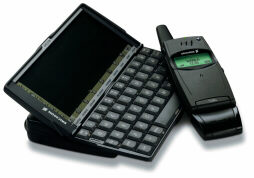
 Finally Symbian brought some news to the market. Since the
Symbian allinance were announced last summer, there has been few news.
Finally Symbian brought some news to the market. Since the
Symbian allinance were announced last summer, there has been few news. 
 Finally Symbian brought some news to the market. Since the
Symbian allinance were announced last summer, there has been few news.
Finally Symbian brought some news to the market. Since the
Symbian allinance were announced last summer, there has been few news.
During CeBIT Symbian announced support for four devices with different screen sizes:
Symbian’s two Smartphone Device Families:
- Small form factor devices with approx. 200 x 200 pixel display.
- Small form factor device with a switchable landscape and portrait display (320 x 120 pixels) (left picture)
Symbian’s two Communicator Device Families:
- Small handheld device with a portrait display (approx. 320 x 240 pixels)
- Handheld device with a landscape display (640 x 200 pixels and up) (right picture)
During CeBIT, Ericsson launched two devices using the Symbian operating system. We should expect to see more Symbian terminals during this year, at least from the Symbian partners Nokia, Motorola and Psion, but don't be surprised if other vendors announce their Symbian terminals later this year.
Another important news from Symbian during CeBIT was an announcement that Symbian will incorporate Java technologies into the Symbian operating system. Java applications and applets at a wireless terminals will be an enabler for a lot of new applications, beyond anything we have seen so far. Just imagin wireless devices communicating with computers and other wireless devices using standard ip protocols. A very important part of Java will be Jini. The combination of Jini and bluetooth will give opportunities beyond imagination. Whenever the user enter a new space, the wireless terminal will be able to check for the services available. The shopping center will give information about its offer, a car wash will give the user information about available washing programs, and more. There will be an article about Jini and bluetooth on this site later this spring (please send an email if you would like to write an article).
Enough about Symbian. At CeBIT different manufacturers showed how bluetooth can be used. Ericsson showed
If bluetooth get support from a critical mass of manufacturers, this technology will be an anabler for a lot of services, in combination with technologies like Jini based on wireless devices with open operating systems.
The last couple of months, the momentum of GPRS has been increasing. Nokia and Ericsson has been rushing news releases telling that operators are signing agreements to test GPRS networks and prepare for commercial launch. The end of march also brought news about an agreement between Ericsson and Qualcom, ending the war about standards and patents for next generation of broadband wireless networks, with Ericsson buying Qualcoms CDMA network business. So the future of networks looks bright.
During CeBIT, Cegetel launched the first commercial WAP service in the world based on Unwired Planets WAP platform. Other operators launching wap trials are T-Mobil in Germany, Europolitan in Sweden, NetCom in Norway, Orange in the UK, Hongkong Telecom Mobile Service and New World Mobility in Hong Kong S.A.R., Radiolinja and Sonera in Finland. It looks like Nokia has been very active and most of the trials announced in march are based on Nokia's plattform, while some of the operators launch trial services using plattforms from both Nokia and Unwired Planet. Unwired Planet added some more vendors licensing it's WAP browser with Alcatel, Panasonic and Sagem.
Mobile commerce has been on the agende for some time now, and during march there were some interesting news showing that this market is emerging; VeriFone and De La Rue announced that they would combina De La Rue's sim card solution with VeriFone's commerce server, VIAG and Schlumberger showed a Mobile Banking solution at CeBIT using Schlumberger's implementation of JavaCard, Ericsson and Telenor (Norway) announced a mobile commerce solution with cinema ticket in test. Mobile Commerce will be an important part of the new wireless information era, with an integration of browsing and smart cards, and we should expect new services while this market is emarging the next few years.
The wireless internet news from CeBIT this year were dominated by Symbian/WAP, but Palm announced a cooperation agreement with Alcatel. This is an important step for Palm, ensuring a foot inside the GSM world. Alcatel has in the past shown innovative terminals like the Alcatel One Touch Com, which included a sharp PDA inside the phone, and we should expect to see some results of this within the next 6-12 months.
News from Wireless Knowledge were invisible during CeBIT, but at the end of march, techweb.com wrote an article telling that Microsoft Networks will be modified to enable wireless access. With this news, combined with previous news from Wireless Knowledge, it looks like Microsoft is looking as much at the service opportunity as the software opportunity of wireless internet. With a wireless device, the network is the computer, and a big part of the business will be services for a large number of network centric wireless media phones. Can Microsoft get a nice portion of this service market?
Conclusion; Get ready, wireless internet is for real this time.